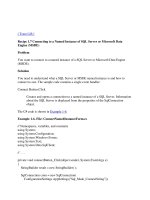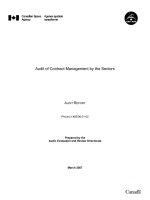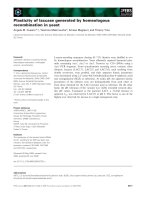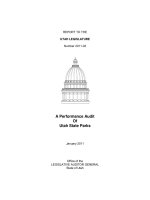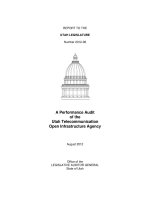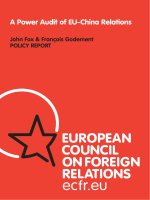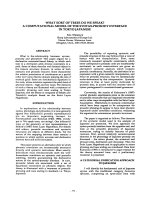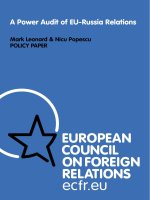A Power Audit of EU-Russia Relations by Mark Leonard & Nicu Popescu doc
Bạn đang xem bản rút gọn của tài liệu. Xem và tải ngay bản đầy đủ của tài liệu tại đây (954.48 KB, 74 trang )
Mark Leonard & Nicu Popescu
POLICY PAPER
A Power Audit of EU-Russia Relations
ABOUT ECFR
The European Council on Foreign Relations was
launched in October 2007 to promote a more
integrated European foreign policy in support of
shared European interests and values. With its
unique structure, ECFR brings a genuinely pan-
European perspective on Europe’s role in the world:
ECFR was founded by a council whose members
include serving and former ministers and
parliamentarians, business leaders, distinguished
academics, journalists and public intellectuals. Their
aim is to promote a new strategic culture at the
heart of European foreign policy.
With offices in seven countries, ECFR’s in-house
policy team brings together some of Europe’s most
distinguished analysts and policy entrepreneurs to
provide advice and proposals on the EU’s big global
challenges.
ECFR’s pan-European advocacy and campaigns will
work through the internet and the media to make
the necessary connections between innovative
thinking, policy-making and civic action.
ECFR is backed by the Soros Foundations Network,
Sigrid Rausing, FRIDE, the Communitas Foundation
and Dr. Hannes Androsch.
ECFR works in partnerships with other
organisations but does not make grants to
individuals or institutions.
www.ecfr.eu
Mark Leonard
Executive Director
Hans Wolters
Deputy Director
Ulrike Guérot
Senior Policy Fellow
Head of Berlin Office
José Ignacio Torreblanca
Senior Policy Fellow
Head of Madrid Office
Thomas Klau
Editorial Director
Head of Paris Office
Ognyan Minchev
Senior Policy Fellow
Head of Sofia Office
Cvetelina Buncheva
Program Assistant
Anthony Dworkin
Senior Policy Fellow
John Fox
Senior Policy Fellow
François Godement
Senior Policy Fellow
Richard Gowan
Policy Fellow
Daniel Korski
Senior Policy Fellow
Alba Lamberti
Advocacy
Pierre Noel
Policy Fellow
Katherine Parkes
PA to Executive Director
Nicu Popescu
Policy Fellow
Zsofia Szilagyi
Communication
and Media Relations
zsofi
Andrew Wilson
Senior Policy Fellow
andrew.wilson @ecfr.eu
Nick Witney
Senior Policy Fellow
Stephanie Yates
Program Assistant
This paper, like all publications of the European Council
on Foreign Relations, represents not the collective views
of the ECFR, but only the views of its authors.
A POWER
AUDIT OF
EU-RUSSIA
RELATIONS
Mark Leonard
& Nicu Popescu
Richard Gowan
Policy Fellow
Daniel Korski
Senior Policy Fellow
Alba Lamberti
Advocacy
Pierre Noel
Policy Fellow
Katherine Parkes
PA to Executive Director
Nicu Popescu
Policy Fellow
Zsofia Szilagyi
Communication
and Media Relations
zsofi
Andrew Wilson
Senior Policy Fellow
andrew.wilson @ecfr.eu
Nick Witney
Senior Policy Fellow
Stephanie Yates
Program Assistant
Copyright of this publication is held by European Council
on Foreign Relations. You may not copy, reproduce,
republish or circulate in any way the content from this
publication except for your own personal and non-
commercial use. Any other use requires the prior written
permission of the European Council on Foreign Relations.
© ECFR November 2007.
Published by the European Council on Foreign Relations
(ECFR), 5th Floor Cambridge House, 100 Cambridge
Grove, London W6 0LE
ISBN: 978-1-906538-00-2
PREFACE
The European Council on Foreign Relations was founded with a statement
that calls on the European Union to develop a foreign policy ‘informed by our
shared values, dedicated to the pursuit of our common European interests,
and sustained by European power.’
The order of the sentence reflects the fact that EU tends to be at its most
comfortable discussing its shared values; it sometimes struggles to define
common interests, while it seems almost ashamed to talk about its power.
It is for that reason that we decided to make our first report an audit of the
power that the Union wields over its most important neighbour, Russia.
There have been many papers produced on EU-Russia relations, analysing
the policies that the EU should adopt to advance its agenda, but we feel that
the main challenge for the Union is its own disunity. The Union urgently
needs to develop a new paradigm to manage its relationship with a resurgent
and consolidated Russian state. This first ECFR report sets out some initial
ideas and analysis which we hope will help spur a debate in national capitals.
It will be followed up with more detailed work at policy level.
In this project, we have tried to implement some practices which will guide
our future activities as the ECFR takes its work into new policy areas.
First, we have tried to look at several dimensions of European power. We have
explored how Moscow sees the EU and uses its power to influence it; how
each member state relates to Russia; as well as the links between Moscow and
EU institutions. This report draws on data gathered by a team of researchers
from all 27 EU member states. Each conducted a survey of their country’s
economic, political and military relations with Russia.
Secondly, we have tried to avoid the euphemistic phrases and diplomatic
practices that cloak tensions within the EU and between the EU and third
countries. In order to promote a common European approach, we have
illustrated some of the areas where the policies of individual member states
have undercut common European objectives. The goal is not to stigmatise
particular countries. Future reports on European foreign policy issues will put
the spotlight on the policies of other states.
i
Thirdly, we have done our best to understand the issues from the perspective
of policymakers. A senior EU official complained to one of the authors about
the propensity of outside observers to simplify complex issues and to imply
that the only thing standing in the way of a successful EU foreign policy is
the stupidity of officials. We have tried to heed this plea and have not offered
any easy, ready-made solutions. We are grateful to the many officials who
have provided us with useful guidance at every step of the research process,
in particular those who took part in a round-table discussion of the interim
findings, attended by officials from all EU institutions and a majority of EU
member states.
ii
EXECUTIVE SUMMARY
Russia has emerged as the most divisive issue in the European Union since
Donald Rumsfeld split the European club into ‘new’ and ‘old’ member states.
In the 1990s, EU members found it easy to agree on a common approach to
Moscow. They coalesced around a strategy of democratising and westernising
a weak and indebted Russia. That strategy is now in tatters. Soaring oil and
gas prices have made Russia more powerful, less cooperative and above all
less interested in joining the west.
Although the EU has failed to change Russia during the Putin era, Russia
has had a big impact on the EU. On energy, it is picking off individual EU
member states and signing long-term deals which undermine the core
principles of the EU’s common strategy. On Kosovo, it is blocking progress
at the United Nations. In the Caucasus and Central Asia, Russian efforts have
effectively shut the EU out of an area where it wanted to promote political
reform, resolve conflicts and forge energy partnerships. And in Ukraine and
Moldova, Moscow has worked hard, with some success, to blunt the appeal
of the European system.
Russia’s new challenge to the EU runs deeper than the threat of energy cut-
offs or blockages in the UN. It is setting itself up as an ideological alternative
to the EU, with a different approach to sovereignty, power and world order.
Where the European project is founded on the rule of law, Moscow believes
that laws are mere expressions of power – and that when the balance of
power changes, laws should be changed to reflect it. Russia today is trying
to revise the terms of commercial deals with western oil companies, military
agreements such as the Conventional Forces in Europe Treaty, and diplomatic
codes of conduct like the Vienna Convention. And it is trying to establish
a relationship of ‘asymmetric interdependence’ with the EU. While EU
leaders believe that peace and stability are built through interdependence,
Russia’s leaders are working to create a situation where the EU needs
Russia more than Russia needs the EU, particularly in the energy sector.
1
A POWER AUDIT OF EU-RUSSIA RELATIONS
The fragmentation of European power
In order to help improve the quality of European debate, the ECFR has conducted
a power audit of the EU-Russia relationship, examining the resources available
to each side, as well as their respective ability to realise their policy objectives.
Although the EU is a far bigger power than Russia in conventional terms – its
population is three and a half times the size of Russia’s, its military spending
ten times bigger, its economy 15 times the size of Russia’s - Europeans are
squandering their most powerful source of leverage: their unity. Contrary to
a widespread perception, the divisions between them are much more complex
than a split between new and old member states. We have identified five
distinct policy approaches to Russia shared by old and new members alike:
‘Trojan Horses’ (Cyprus and Greece) who often defend Russian
interests in the EU system, and are willing to veto common EU positions;
‘Strategic Partners’ (France, Germany, Italy and Spain) who enjoy
a ‘special relationship’ with Russia which occasionally undermines common
EU policies; ‘Friendly Pragmatists’ (Austria, Belgium, Bulgaria, Finland,
Hungary, Luxembourg, Malta, Portugal, Slovakia and Slovenia) who maintain
a close relationship with Russia and tend to put their business interests above
political goals; ‘Frosty Pragmatists’ (Czech Republic, Denmark, Estonia,
Ireland, Latvia, the Netherlands, Romania, Sweden and the United Kingdom)
who also focus on business interests but are less afraid than others to speak out
against Russian behaviour on human rights or other issues; and ‘New Cold
Warriors’ (Lithuania and Poland) who have an overtly hostile relationship
with Moscow and are willing to use the veto to block EU negotiations with Russia.
Broadly speaking, the EU is split between two approaches – and each of the
five groups tends towards one of the main policy paradigms. At one end of the
spectrum are those who view Russia as a potential partner that can be drawn
into the EU’s orbit through a process of ‘creeping integration.’ They favour
involving Russia in as many institutions as possible and encouraging Russian
investment in the EU’s energy sector, even if Russia sometimes breaks the
rules. At the other end are member states who see and treat Russia as a threat.
According to them, Russian expansionism and contempt for democracy must be
rolled back through a policy of ‘soft containment’ that involves excluding Russia
from the G8, expanding NATO to include Georgia, supporting anti-Russian
regimes in the neighbourhood, building missile shields, developing an ‘Energy
Nato’ and excluding Russian investment from the European energy sector.
ECFR/02 November 2007
2
Neither of these approaches has replaced the 1990s model of ‘democratising
Russia.’ Each has obvious drawbacks, making both unpalatable to a
majority of EU member states. The first approach would give Russia
access to all the benefits of co-operation with the EU without demanding
that it abides by stable rules. The other approach - of open hostility
- would make it hard for the EU to draw on Russia’s help to tackle a host
of common problems in the European neighbourhood and beyond.
The Need for a New Paradigm: Promoting the Rule of Law
Despite EU member states’ different interests, history and geography, there is
a chance today to agree on a new and better approach, as it is increasingly clear
that the status quo works against the interests of all five groups. To develop a
new paradigm for the relationship, Europeans will need to rethink the goals,
means and policies that define their relations with Russia.
While the long-term goal should be to have a liberal democratic Russia as
a neighbour, a more realistic mid-term goal would be to encourage Russia
to respect the rule of law, which would allow it to become a reliable partner.
The rule of law is central to the European project, and its weakness in Russia
is a concern for all Europeans working there. Russia’s selective application of
the law affects businesses who worry about respect of contracts, diplomats
who fear breaches of international treaties, human rights activists concerned
about authoritarianism, and defence establishments who want to avoid
military tensions. An approach based on the rule of law would also have
positive echoes within Russian society, where even citizens who have become
cynical about the language of democracy are concerned about corruption and
the arbitrary exercise of power by the state.
If EU leaders manage to unite around such a common strategy, they will be
able to use many points of leverage to reinforce it. This report sets out some of
the areas where policymakers could rethink their approach in line with a ‘rule
of law paradigm’:
3
A POWER AUDIT OF EU-RUSSIA RELATIONS
• Conditional Engagement with Russia. Proponents of ‘soft containment’
and ‘creeping integration’ debate whether Russia should be excluded from the
G8, and whether to block the negotiation of a new Partnership and Cooperation
Agreement.
Under a ‘rule of law’ approach, the EU would keep Russia engaged in these
institutions, but adjust the level of cooperation to Russia’s observance of the
spirit and the letter of common rules and agreements. If Moscow drags its
feet on G8 commitments and policies, more meetings should be organised on
these topics at a junior level under a G7 format - excluding Russia. Similarly,
the Union should not be afraid to use the EU-Russia summit and the negotiation of
a new Partnership and Cooperation Agreement to highlight issues where Russia
is being unhelpful, such as Kosovo and the conflicts in Georgia and Moldova.
• Principled Bilateralism. Proponents of ‘creeping integration’ see
bilateral relations as a good way to reach out to Russia at a time of tension.
Their opponents tend to see such contacts as a kind of betrayal (for example,
Polish politicians have described the Nordstream deal as a new Molotov-
Ribbentrop pact).
Under the ‘rule of law’ paradigm, the EU should aim for ‘principled
bilateralism.’ The goal would be to ensure that bilateral contacts between
Russia and individual EU member states reinforce rather than undermine
common EU objectives. Equally, most member states would value an early
warning system which would allow both upcoming crises and upcoming deals
to be discussed internally in the Union.
• Integrate the Neighbourhood. Member states favouring ‘creeping
integration’ want to avoid competition for influence with Russia in Europe’s
neighbourhood. On the other hand, countries that favour ‘soft containment’
want the EU to increase its activities in countries such as Georgia, Ukraine,
Moldova and Belarus in order to roll back Russian influence.
Under the approach we advocate, the EU would focus on encouraging these
countries to adopt European norms and regulations and thus integrate
them into the European project. The Union could also invest in electricity
interconnections with some neighbouring countries, give them access to the
Nabucco pipeline, extend the European Energy Community and seek the full
application the energy acquis in Turkey, Ukraine and Moldova. This could lead
to the unbundling of energy companies in these states, greater transparency
ECFR/02 November 2007
4
in their energy sectors and, consequently, greater energy security for Europe
and fewer possibilities for Russia to use energy as an instrument of foreign
policy. Equally, the EU should explore the possibility of giving the Trade
Commissioner a mandate to fast-track access to the EU market for selected
products in the case of any more politically motivated Russian embargoes
such as those imposed on Georgian and Moldovan wines.
• Enforce the Law. A ‘creeping integration’ approach focuses on signing
agreements with Russia and promoting mutual investments and dialogue
in the hope that this will transform the way Russian elites conduct their
business and diplomacy. A ‘soft containment’ approach would seek to
limit interaction with Russia as well as Russian influence inside the EU.
A ‘rule of law’ approach would promote mutual agreements and investments,
but be much tougher on their implementation. For example, the European
Commission should be given political support to apply competition policy
in the energy sector, and to investigate some of the more dubious deals
between Russian and EU companies. More generally, the EU should demand
the enforcement of the growing number of agreements which have not been
implemented – the PCA, the four Common Spaces and the European Energy
Charter. Ignoring Russian foot-dragging undermines the very principle of a
rules-based relationship with Russia.
• Rebalance the Relationship. The EU should neither try to minimise
its contact with Russia as proponents of ‘soft containment’ have suggested,
nor submit to a relationship skewed in Russia’s favour where dependence is
weighted in one direction.
To rebalance the relationship, the EU needs to adopt an internal code
of conduct on energy deals and guidelines on long-term contracts and
forthcoming mergers. In order to avoid further monopolisation and
partitioning of the EU energy market, the European Commission could be
granted the right to pre-approve big energy deals on long-term contracts and
pipelines concluded between EU and foreign energy companies. The practical
goals should be open competition, the rule of law and an integrated and
flexible gas market.
5
A POWER AUDIT OF EU-RUSSIA RELATIONS
The biggest challenge will not be to devise new individual policies, but
to strengthen the EU’s most powerful tool for dealing with Russia: unity.
The EU has a basic choice to make: either member states continue to pursue
bilateral agendas, but ultimately all lose out. Or it can unite – which will
require individual member states to make possibly painful concessions –
and exercise real influence over the nature of the relationship with Russia.
In order to help achieve this level of unity, the EU could form pioneer groups
of member states working out a common strategic assessment and joint action
points on key issues such as Ukraine, Central Asia or foreign energy policy. The
goal should be to seek, with the help of EU institutions, the widest possible
consensus among EU member states for policies that strengthen the rule of
law. This will require an effort of persuasion in the case of most member states.
If the EU wants to have Russia as a law-abiding, reliable, and eventually
democratic neighbour on a continent where even the last shadows of the Iron
Curtain have dispelled, it must build its partnership with Russia on the same
foundations that made European integration a success – interdependence
based on stable rules, transparency, symmetrical relations and consensus.
These foundations will not build themselves. The Union must be much
more determined about agreeing rules of engagement with Russia, and then
defending them.
ECFR/02 November 2007
6
Introduction: The Asymmetrical Interdependence
After 1991, European governments grew accustomed to Russian acquiescence.
Moscow might have put up a struggle against European policies – from
humanitarian intervention in Kosovo, NATO and EU enlargement, to visa
arrangements for Kaliningrad and the Kyoto Protocol on climate change
– but the Kremlin’s bark always proved worse than its bite. The Russian
government, crippled by massive debt, financial instability and the war
in Chechnya, caved in each time because of its reliance on Western help.
Today it is Moscow that sets the pace for EU-Russia relations. The soaring
prices of gas and oil have made energy-rich Russia more powerful, less
cooperative and more intransigent. Oil money has boosted the state budget
and has dramatically decreased the Russian state’s dependence on foreign
funding. Russia’s hard currency reserves are the third largest in the world
today; the country is running a huge current account surplus and paying
off the last of the debts accumulated in the early 1990s. While in the 1990s
everybody was talking about Russian dependence on Western credits, now
everyone talks about Western dependence on Russian gas. Moscow has
succeeded in regaining a greater level of control over the entire territory
of the Federation. Chechnya is ‘pacified’ – at least for the time being – and
President Vladimir Putin enjoys the support of more than 80 % of Russian
citizens. Russia’s influence in global politics has increased dramatically as
well. It has managed to regain a strategic hold in Central Asia. Putin invested
a lot of energy and political skills in building the Shanghai Cooperation
Organization into a potential counter-weight to Western influence in the
region. Russia’s military budget has increased six-fold since the turn of the
century and its intelligence network has penetrated all corners of Europe.
Russia’s growing confidence has transformed the EU-Russia relationship.
It is the Kremlin that puts issues on the agenda, pursues them in the face
of European opposition and increasingly defines the rules of the game. On
energy, Russia is picking off individual EU member states and signing long-
term deals which undermine the core principles of the Union’s common
strategy. On Kosovo, Russia is blocking progress at the United Nations. In the
Caucasus and Central Asia, Moscow has effectively shut the Union out of an
area where it has an interest in promoting political reform, resolving conflicts
and forging energy partnerships. And in Ukraine and Moldova, Moscow has
worked hard, with some success, to blunt the appeal of the European system.
7
A POWER AUDIT OF EU-RUSSIA RELATIONS
Russia’s challenge to the EU runs deeper than energy dependency or
blockages in the UN. Russia is emerging as an ideological alternative to
the EU that offers a different approach to sovereignty, power and world
order. Whereas the EU stands for an idea of order based on consensus,
interdependence and the rule of law, Russian foreign policy is motivated
by a quest for power, independence and control. The EU’s main concern
is to ensure that its neighbourhood is peaceful and well-governed. Russia
wants to expand its sphere of influence and achieve control of economic
interests and energy assets in neighbouring countries and the EU.
What makes Russia’s ascendance so surprising is that on almost all indicators
of power – soft and hard - the European Union continues to outrank
Russia, by some measures even more than in the 1990s. The EU’s combined
economy is almost 15 times the size of Russia’s. Even with all the oil wealth,
Russia’s GDP is barely as big as Belgium’s and the Netherlands’ combined.
1
The EU’s population is three and a half times the size of Russia’s; its military
spending is seven times bigger
2
; the EU has five seats on the UN Security
Council (of which two are permanent) to Russia’s one. Trade figures tell
a similar story. The EU buys 56% of Russia’s exports and supplies 44% of
its imports, while Russia buys only 6% of what the EU sells, and supplies
just 10% of what the Union buys from abroad. Even in the energy sphere,
interdependence defines the relationship as much as one-way dependency.
Between 2000 and 2005, Russia’s share of EU gas imports declined from 50%
to 40%
3
, Russian gas represented only 25% of EU gas needs, while the Union
accounted for 70% of Russia’s sales. Russia may supply a large percentage of
the EU’s energy, but given the absence of pipelines to China, Russia - at least
in the medium term - has no practical alternative to the EU market. Measured
in ‘soft power’ terms, the EU’s lead is even greater. An opinion poll for the
BBC World Service in 33 countries showed that not one had a predominantly
negative view of the European Union, while 23 saw the EU in a positive light.
Russia, on the other hand, was seen negatively in 16 countries, while only two
had a majority with a positive perception of Russia.
4
1
World Bank, Key Development Data and Satitistics, www.worldbank.org
2
Russian military spending in 2005 was $34 billion.
3
Pierre Noel “The EU-Russia natural gas relationship: Challenges and Policy Responses”, Testimony at hearings
on Energy security in the OSCE region, Commission on Security and Cooperation in Europe, Washington DC,
25 June 2007.
4
BBC World Service Poll published on World Public Opinion, “Global Poll Finds Iran Viewed Negatively”,
3 February 2006, />&lb=hmpg1
ECFR/02 November 2007
8
Dependence on Russia v Dependence on Gas.
5
5
The authors would like to thank Pierre Noel for supplying us with this table.
9
A POWER AUDIT OF EU-RUSSIA RELATIONS
While the EU holds the stronger hand, its game of late has been consistently
weaker than Russia’s. If one defines power as the ability to achieve objectives
rather than as the resources a country commands, Russia is in the ascendant;
and it frequently uses that power to weaken the Union. The EU tends to be
most successful when it can pool the power of its 27 member states to deal
with multiple issues and put together complex package deals. Yet the EU has
allowed its relationship with Russia to be organised in a way that diminishes
its own potential power and boosts Russia’s. The relationship has become
focused on a few small areas where Russia has big and visible sticks, such
as energy and vetoes in the UN Security Council, and it is conducted largely
through bilateral links rather than common channels. Because Russia today
is a centralised state dealing with a grouping of states retaining autonomous
foreign policies, it is much more adept at agreeing on objectives and
marshalling its power behind it than the EU. This has allowed Russia to
maximise its influence over the Union, while the EU has been less able to
capitalise on its potential to influence Russia. In short, Russia has transformed
its weakness into power, while Europe’s power has been turned into weakness.
ECFR/02 November 2007
10
1: Turning Weakness into Power:
Russia’s Approach to the European Union
From his garret office on the banks of the river Moskva, Gleb Pavlovsky
has a ring-side view of the Kremlin. The architect of Vladimir Putin’s two
election victories has set up a telescope by his desk that points directly
down towards his political master’s power base. In the mid-1990s, Gleb
Pavlovsky was part of a small group of political strategists, or ‘technologists’
as they are called in Moscow, who launched ‘project successor’ – an attempt
to recruit a new leader to take over from the ailing and unpopular Boris
Yeltsin. This group includes other key figures: high-level officials in the
presidential administration like Vladislav Surkov and, until recently, Modest
Kolerov
6
, and non-official strategists such as Sergei Markov and Vyacheslav
Nikonov. Over the last decade, they have helped Putin to become the
dominant political figure in 21st century Russia, reshaping in the process
the country’s domestic politics and, more recently, its international strategy.
Their goal has been to help the Kremlin to re-establish control of the Russian
economy and society without losing the international respectability that comes
from being a democracy. They have created a ‘Sovereign Democracy’ which has
allowed Putin not just to fake political pluralism (by establishing state-controlled
political parties, NGOs and media), but to fake a revival in Russia’s power
(by picking fights with external enemies), to fake its embrace of globalisation
(by taking advantage of foreign markets and capital while insulating parts of
Russia’s own economy and politicising trade), and to trumpet its adherence
to the rule of law (by selectively implementing legislation to serve political
priorities)
7
. These political ‘technologies’, developed for use at home, have
increasingly been used in international politics and economic policy. Russia’s
recent trade blockades, and its interruptions of the supplies of gas, oil and
electricity to neighbouring countries, have been explained away on technical
grounds. When Western businesses were deprived of energy assets in Russia, they
were told that it was because they had not respected environmental standards.
6
Vladislav Surkov is deputy head of the presidential administration, and Modest Kolerov was head of the
department for interregional and cultural ties with foreign countries in the presidential administration of the
Russian Federation between March 2005 and October 2007.
7
On ‘selective law-enforcement’ and the principle of ‘suspended punishment’ which allow the state to manipulate
the laws against adversaries, see Alena V. Ledeneva, How Russia Really Works, Cornell University Press, 2006,
pp. 48 and 85.
11
A POWER AUDIT OF EU-RUSSIA RELATIONS
This is how ‘virtual politics’ can confuse European governments who find
themselves in an ‘Alice in Wonderland’ world where laws and technical
standards are manipulated to suit the interests of the state.
8
Russians remark jokingly that when oil is at $15 a barrel, Russia is an appendage
to the world economy, whilst at $70 a barrel, it is an energy superpower.
9
The redistribution of energy incomes and the spill-over of economic growth
into other areas of the economy has allowed the ruling elite to build and
retain public support. In Russia’s system of ‘Sovereign Democracy’, only one
part of Abraham Lincoln’s famous definition of democracy really counts: the
perception that government is ‘for the people’. Economic growth, security
and social benefits matter far more than the institutions of liberal,
representative democracy or the mechanisms to ensure that government
is not only for the people, but selected by it. Within this logic, it is hardly
shocking that opinion polls are seen as more important than elections. Gleb
Pavlovsky explains that Putin’s popularity stems from his remarkable capacity
to crystallise, express and even pre-empt the public’s expectations - a skill
facilitated by the weekly polling and focus groups that are conducted by a
‘sociology-obsessed’ Kremlin.
Putin’s ideology of ‘Russia on the rise’ appeals to elites across the political
spectrum – from free-market liberals to nostalgic communists and from
pro-Europeans to Eurasianists. His first-term popularity was built on the
foundation of a series of internal ‘victories’ – against terrorism in Chechnya,
against the alleged danger of Russia’s disintegration and against the oligarchs.
When he ran out of internal opponents, Putin’s attention shifted to the
international stage – picking fights with the US, Georgia, Poland and Estonia.
Political technologists compare Putin’s situation to riding a bicycle: unless he
carries on peddling, he will fall over. Victories are seen as a survival strategy;
as one technologist put it: “avenging the demise of the Soviet Union will keep
us in power.”
10
This need helps to explain the profusion of bilateral problems
in the EU-Russia relationship. The political imperative for national victories
has made a famously calculating ruling class increasingly unpredictable.
8
See Andrew Wilson, Virtual Politics: Faking Democracy in the Post-Soviet World, New Haven, CT: Yale
University Press, 2005.
9
Georgi Derluguian, The Fourth Russian Empire?, PONARS Policy Memo 114, December 2006, Center for
Strategic and International Studies, p.5.
10
ECFR interview with a Russian expert, Moscow, 3 July 2007
ECFR/02 November 2007
12
Because Russia’s quest for great power status must be fuelled by outbursts
of theatricality, European policymakers are frequently confronted by
unpragmatic behaviour from pragmatic Russian elites.
Russia’s assertiveness is encouraged by a growing perception that Europe is
weak and in decline. Russians think the EU has been politically incapacitated
by the rejection of the constitutional treaty and the persistent internal divisions
between new and old member states. Putin’s special envoy on EU relations
says that “many of the pillars of European integration are crumbling.”
11
Economically, Russians see the EU as a “bureaucratic formation pursuing
socialist economic policies that stifle economic growth.”
12
Politically, the
EU projects an image of weakness in the neighbourhood. Russia no longer
fears that the European Neighbourhood Policy will erode its influence. Gleb
Pavlovsky, who was humiliated when his Ukrainian client Viktor Yanukovych
was ousted in the Orange Revolution, argues that: “The EU provoked and
supported coloured revolutions but failed to manage the consequences. Just
look at the mess in Serbia and Ukraine.” Russians see the EU’s culture of
compromise as Europe’s biggest weakness. Furthermore, they overestimate
the EU’s internal crisis, which encourages them to act ever more assertively in
their relations with the Union.
Together, these perceptions inform the four elements of Russia’s strategy
towards the EU: bilateralising relations with most EU member states,
strengthening Russian influence in the post-Soviet space, revising the
political, legal and economic basis of relations with the Union, and promoting
asymmetric interdependence with a divided EU.
Divide and Rule
European divisions over Russia originate in history and geography. However,
they have been deliberately exacerbated by a Russian strategy of ‘divide and
rule’. Russia has sought to bilateralise both its deals and its disputes with
EU member states, putting a strain on EU solidarity and making Russia
the stronger power. This is not part of a master plan to dismember the EU.
11
Interview with Sergey Yastrzhembsky, Echo Moskvy, 17 November 2006.
/>12
Sergei Medvedev, EU-Russian Relations: Alternative Futures, The Finish Institute of International Affairs,
2006 p 5.
13
A POWER AUDIT OF EU-RUSSIA RELATIONS
It is, after all, natural for Moscow to deal with individual EU member states
because that is how it sees international politics – as a series of tête-à-têtes
between great powers. It mounts charm offensives to seduce the political and
economic leaders of big member states while coercing weaker neighbours with
political and economic pressure. Konstantin Kosachev, the chair of the Duma’s
international relations committee, neatly summed up the new perspective in
an interview with the authors: “We are sick and tired of dealing with Brussels
bureaucrats. In Germany, Italy, France, we can achieve much more. The EU is
not an institution that contributes to our relationship, but an institution that
slows down progress.”
13
Russia has strengthened its political relationships by recruiting big business
to act as a lobbyist for the Russian cause inside key EU countries. Its state-
controlled companies have built partnerships with companies such as E.ON
and BASF in Germany, ENI in Italy, GDF and - to a lesser extent - Total in
France, and Gasunie in the Netherlands. Even in the context of deteriorating
relations with the UK, Russia decided to buy out rather than expropriate Shell
and BP in Sakhalin II and Kovykta, respectively. Gazprom forced Shell and
BP to sell controlling stakes in the projects for less than their market price
but retained these companies as minority partners.
14
Gazprom needed the
technical expertise of these companies in order to be able to develop the gas
fields. However, a Russian expert told us that Gazprom had also decided to
keep BP and Shell as partners as part of a deliberate attempt to build up a pro-
Russian lobby. It worked. Within weeks of the deal, BP’s chief executive Tony
Hayward was publicly defending the Russian position.
15
Russia’s charm offensive towards friendly member states is mirrored in the
assertive stance taken towards less friendly ones. For example, Russia called
for a boycott of Danish goods after the October 2002 Chechen Congress in
Copenhagen; it interrupted oil supplies to Latvia in 2003 and Lithuania in
2006; it allowed a youth group called ‘Nashi’ with close ties to the Kremlin
to harass the UK ambassador after he attended an opposition conference
in 2006; and it allowed the same group to besiege the Estonian embassy in
Moscow following a dispute over the moving of a war memorial in Tallinn in
May 2007.
13
ECFR interview in Moscow, 4 July 2007.
14
International Herald Tribune, ‘Shell cedes control of Sakhalin-2 to Gazprom’, 21 December 2006,
and Moscow Times, ‘Gazprom Gets Kovykta on the Cheap’, 25 June 2007
15
Tony Hayward, BP chairman, speech at Investing Prosperity Conference, Moscow 17 June 2007
ECFR/02 November 2007
14
Our research in the 27 EU member states reveals a systematic policy of coercive
bilateralism that includes diplomatic pressure, trade embargoes, transport
blockades and early renegotiation of gas or oil supply contracts. Moscow’s
readiness to use coercion in foreign policy - especially when it comes to Central
and Eastern European states - has shifted the terms of the debate. Set against
an EU that is seen as weak and paralysed, fear of Russia has created incentives
for a number of Central and Eastern European states – inside and outside the
EU - to become increasingly accommodating towards Russia.
Russian Bilateral Disputes with EU Member States under Putin’s Presidency
BULGARIA
DENMARK
ESTONIA
FINLAND
GERMANY
LATVIA
LITHUANIA
NETHERLANDS
POLAND
SWEDEN
UK
Early renegotiation of gas contracts; threat of pork ban
Diplomatic pressures; harassment of Danish companies
and NGOs
Diplomatic pressures; cyber attacks; trade and
transportation embargoes; discriminatory rail tariffs
Russian export taxes on timber
Oil supply cuts, Lufthansa cargo dispute
Discriminatory rail tariffs; trade sanctions (canned sprats)
Oil blockade; discriminatory rail tariffs
Trade disputes (flowers, fruits and vegetables);
renegotiation of gas contracts (Shell)
Meat and vegetables embargo
Russian export taxes on timber
Diplomatic pressures; revision of contracts (BP and Shell);
pressures on the British Council; murder of Litvinenko and
refusal to extradite Lugovoi
15
A POWER AUDIT OF EU-RUSSIA RELATIONS
As EU member states fail to coordinate their policies towards Russia, Moscow
has not only gained influence over the EU, but also within the EU through
its relations with key member states.
16
As the EU Commissioner for Trade,
Peter Mandelson, has claimed: “No other country reveals our differences as
does Russia. This is a failure of Europe as a whole, not any member state
in particular.”
17
What is more, Moscow’s policy of divide and rule is self-
reinforcing. EU member states tend to ‘Europeanise’ their disputes with
Russia while they bilateralise their ‘sweet deals’. As a result, progress on the
EU-Russia agenda has ground to a halt because of disputes around trade and
access to energy. This pushes even more substantive cooperation on energy
or political dialogue down bilateral channels between Russia and individual
member states.
Bilateral agreements with Russia have undermined the EU’s ability to secure
key policy goals. In the energy sphere, Russia’s deals with Italy, Austria,
Hungary and Bulgaria about pipelines and gas storage facilities undermine
the key Nabucco gas pipeline project aimed at diversifying gas supply routes.
Similarly, France, Germany and Italy signed separate bilateral visa facilitation
deals with Russia, which were deemed to breach Schengen rules and were
thus suspended by the European Commission. This forced the entire EU to
negotiate a visa facilitation deal with Russia, well ahead of negotiating similar
agreements with countries such as Macedonia, Albania or Serbia. In the
Eastern neighbourhood, many initiatives the EU might have undertaken to
help resolve conflicts in Georgia and Moldova were blocked by member states
concerned about Russia’s possible reaction. For example, Greece, in Spring
2007, stopped the EU from extending the mandate of the EU Border Support
Team in Georgia to include the secessionist region of Abkhazia.
Russia has occasionally overplayed its hand. For example, its handling of the
status of Kosovo, the US missile shield in the Czech Republic and Poland, and
its growing use of energy policy as a foreign policy tool, have all pushed the EU
to adopt a more unified stance on these issues. A senior European diplomat
summed up the feelings of many governments when he admitted that “the
Russians are right on the substance of missile defence, but they have behaved
so badly that they have lost the argument. We cannot be seen as giving them a
veto on these types of issues.”
16
ECFR interview with an EU official, Brussels, 1 June 2007.
17
Speech by European Commissioner for trade, Peter Mandelson, The EU and Russia: Our Joint Political
Challenge, Bologna, 20 April 2007.
ECFR/02 November 2007
16
Neighbourhood Pushback
When ‘coloured revolutions’ swept through Georgia and Ukraine in 2003
and 2004, the Russian elite was plunged into deep depression about Russia’s
declining influence in its ‘near abroad’. But the elite’s foreign policy failures
toughened it for what it sees as a competitive struggle for influence in a
hostile, Hobbesian world. In March 2005, Modest Kolerov, a close associate
of Gleb Pavlovsky, was appointed head of a directorate in Putin’s presidential
administration responsible for coordinating Russian policy towards post-
Soviet states. His brief was to develop a new neighbourhood policy that could
counter the EU’s magnetic pull.
Contrary to what many in Europe think, Russia’s neighbourhood policy is
better developed, better coordinated and better implemented than the EU’s.
Russia devotes more political, economic and even military resources to
influencing its neighbourhood than the EU does. Indeed, Moscow has plenty of
tasty carrots to offer its allies: cheap energy, access to a relatively open labour
market, a growing market for goods, a visa-free regime, diplomatic protection
in international fora, and – to some inhabitants of the secessionist regions
of Abkhazia, South Ossetia and Transnistria – even Russian citizenship and
pensions. Its sticks are also sharper than the EU’s: it can impose full-scale
blockades, sudden increases in gas prices and infrastructure takeovers; it can
also offer support for separatist entities, and even exert military pressures on
states that refuse to yield to Russian demands.
In relatively open - but politically weak - states such as Ukraine and Moldova,
Russia has exerted economic pressure and influenced domestic politics
through Russian-supported media, NGOs, youth groups and political
parties.
18
As a result of Russian pressure, President Viktor Yushchenko has
accepted Gazprom’s inroads - via RosUkrEnergo - into Ukraine’s gas, oil
and electricity infrastructure.
19
The divisions within Ukrainian society – so
skilfully exploited by Russian proxies – have paralysed moves towards NATO
membership. Moldova has recently moved closer to Russia, not least on the
conflict in Transnistria. And the Kremlin has increased its leverage over allies
such as Armenia and Belarus through takeovers of sensitive parts of their
energy infrastructure.
18
Nicu Popescu, Russia’s Soft Power Ambitions, Policy Brief 115, Centre for European Policy Studies (CEPS) , 27
October 2006.
19
See Yulia Mostovaya, ‘Another story of a free lunch’, Zerkalo Nedeli, 10-16 February 2007, ‘New gas revelations’,
Zerkalo Nedeli, 4-10 February 2006, and ‘RosUkrEnergo nachinaet
i ’, Zerkalo Nedeli
17
A POWER AUDIT OF EU-RUSSIA RELATIONS
Russia’s Power in the Neighbourhood
For governments in Central Asia, Russia’s model of ‘sovereign democracy’ is
attractive. A widespread fear of Western demands for reform, coupled with
possibilities for shared rent-seeking between local post-Soviet and Russian
elites, has helped to drive these regimes into Russia’s embrace. These states
have enabled Russia to boost its leverage over Europe by allowing Russia
to become a monopoly gas supplier. In May 2007, Moscow reached an
agreement with Turkmenistan, Kazakhstan and Uzbekistan on a new gas
pipeline to Russia, effectively killing plans for a Transcaspian pipeline which
would have delivered gas to Europe without passing through Russia. It also
signed long-term contracts with Turkmenistan and Uzbekistan, allowing
Russia control over gas which was available for export to Europe.
20
By securing
a monopoly of gas exports from Kazakhstan, Turkmenistan and Uzbekistan,
Gazprom hopes to be able to fulfil its growing gas export commitments to
Europe, cover its own gas deficit, as well as strengthen Europe’s dependence
on Russian gas.
21
HARD POWER
• Blockades of wine, vegetables,
meat, dairy products
• Oil and gas embargoes
• Transport and communications
blockades (railway, postal services,
bank transfers)
• Different energy prices
• Infrastructure takeovers
• Secessionist conflicts
• Non-withdrawal of troops
• Arms at discount prices for allies
SOFT POWER
• Russian mass-media
• Financing NGOs
• Economic growth
• Visa free regime
• Open labour market
• Authoritarian capitalism
• Protection of authoritarian regimes
• Exporting ‘sovereign democracy’
• Russian citizenship and pensions
• Military training
20
Martha Brill Olcott, International Gas Trade in Central Europe: Turkmenistan, Iran, Russia, and Afghanistan,
Program on Energy and Sustainable Development, Standford University May 2004, Page 26, http://www.
rice.edu/energy/publications/docs/GAS_InternationalGasTradeinCentralAsia.pdf; Vladimir Socor, ‘Uzbek
Gas Output, Export Set to Grow Under Russian Monopoly Control’ Eurasia Daily Monitor, 22 February 2007;
21
Keith C. Smith, Russian Energy Pressure Fails to Unite Europe, Centre for Strategic and International Studies,
January 2007, page 3.
ECFR/02 November 2007
18
Russian hard power has not always delivered results. In Georgia, Russia ended
up increasing the popularity of the very government it had tried to undermine.
And where Russia has used sanctions, it has diminished its future economic
leverage by driving the targets of sanctions to diversify their economies.
The countries that have best managed to withstand Russian pressure were
those - such as Georgia and Azerbaijan - with access to alternative political
and economic support. Azerbaijan could rely on its own energy resources,
while Georgia benefited from US diplomatic support and access to Azerbaijani
gas and oil.
Russia’s Revisionism
From Russia’s perspective, the West has spent the last two decades rewriting
the rules that govern their relationship. Russian objections were ignored when
it came to NATO and EU enlargements, the withdrawal of the US from the
ABM Treaty, plans for a partial anti-ballistic missiles shield in Europe, the
establishment of new US military bases in Europe, and the Kosovo campaign.
Russia was forced to accept these changes to the rules because it was weak and
had been defeated in the Cold War.
Now Moscow is seeking to revise the post-Cold War settlement itself. It does
not want to become part of the West anymore and it is challenging all the
strategic, political and economic agreements that were signed in the 1990s.
In the military sphere, Russia is seeking to renegotiate the Conventional
Forces in Europe Treaty (CFE) – an arms reduction treaty - and keep its
troops in Georgia and Moldova, despite an explicit commitment to withdraw
them. Russia had agreed at the November 1999 OSCE summit in Istanbul
to a complete and unconditional withdrawal of its military troops in Georgia
and Moldova by the end of 2001 and 2002 respectively.
22
As part of the same
package, the West agreed to adapt the CFE to better suit post-Cold War
realities and Russia’s security worries. Now Russia seeks to renegotiate the
package by having the adapted CFE ratified by EU member states and the
US, while not complying with its commitments on troops withdrawal from
Moldova and the Gudauta military base in Georgia.
22
Istanbul Document, Organisation for Security and Cooperation in Europe, 1999 Istanbul summit,
19
